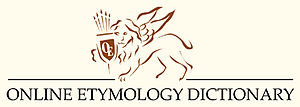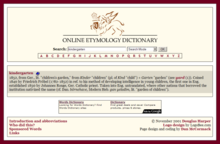- Online Etymology Dictionary
-
Online Etymology Dictionary 
Type Private Founded Online (c.2000) Headquarters Lancaster, PA, USA Key people Douglas Harper, Founder
Dan McCormack, Web Design and codingEmployees 1 Website www.etymonline.com Type of site Etymological dictionary Registration no Available in English Current status active Screenshot 
Screenshot of etymonline.comThe Online Etymology Dictionary is an online dictionary that describes the origins of English-language words.[1] The abbreviation, OED, coincides with the frequently used acronym for the Oxford English Dictionary.
Contents
Description
Douglas Harper created the etymology dictionary to record the history and evolution of more than 30,000 words, including slang and technical terms.[2]
Reviews and reputation
The Online Etymology Dictionary has been referenced by Ohio University's Library as a relevant etymological resource[1] and cited in the Chicago Tribune as one of the “best resources for finding just the right word.”[3] It is cited in numerous articles as a source for explaining the history and evolution of words.[4][5][6]
References
- ^ a b Ohio University, Online Etymology Dictionary. Created 2003, http://infotree.library.ohiou.edu/single-records/2705.html, accessed 2007-01-05.
- ^ Online Etymology Dictionary. Accessed December 31, 2006
- ^ Bierma, Nathan. Internet has best resources for finding just the right word. Chicago Tribune, January 3, 2007, republished by www.factiva.com, http://proxy.bib.uottawa.ca:2241/sb/default.aspx?NAPC=S&fcpil=en, accessed 2007-01-05.
- ^ Rudeen, Mike. Any questions?; Ask! away on the News' new blog. Rocky Mountain News, December 18, 2006, republished by www.factiva.com, accessed 2007-01-05
- ^ Murali, D. Big results require big ambitions. Business Line (The Hindu), July 21, 2006, Section:Opinion, republished by Factiva.com, accessed 2007-01-05
- ^ Whyte, Ellen. Online resources to help improve your vocabulary. New Straits Times, October 27, 2005, republished by www.factiva.com, accessed 2007-01-05
External links
Categories:- Etymological dictionaries
- Etymology
- Online dictionaries
Wikimedia Foundation. 2010.
